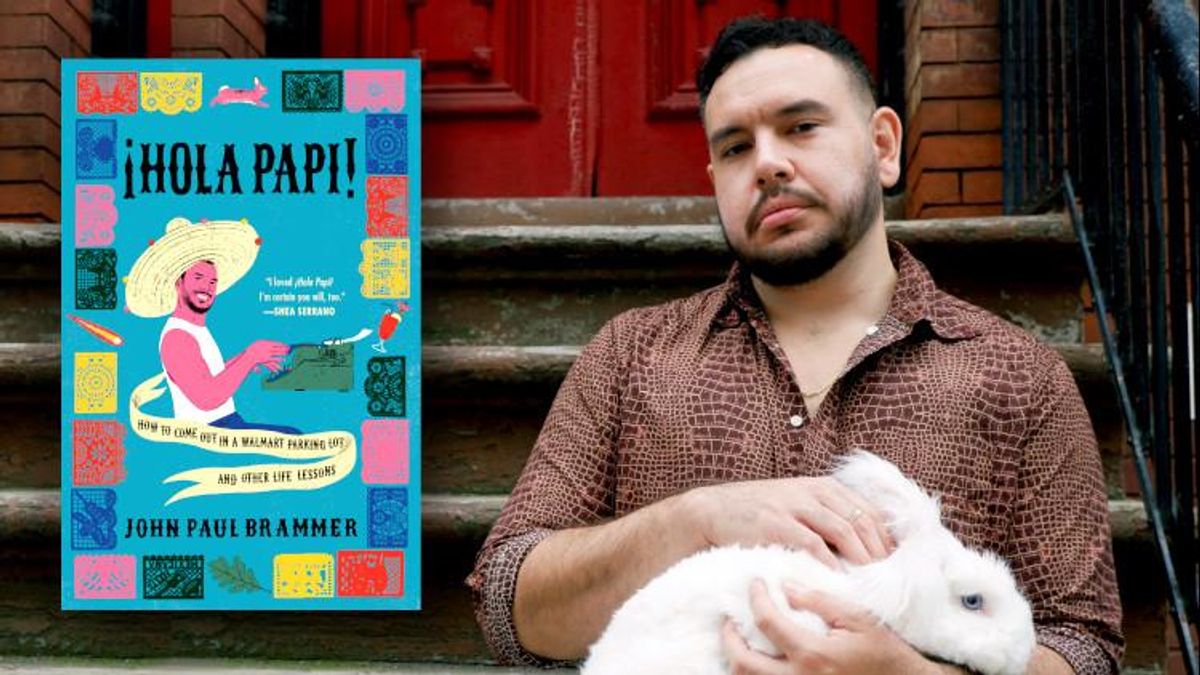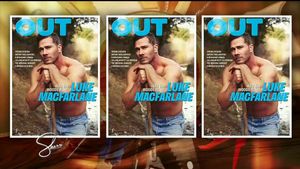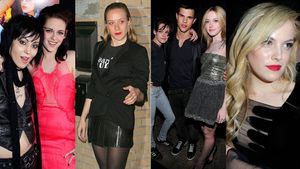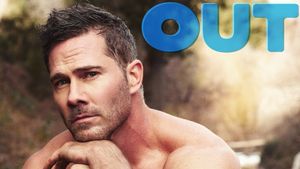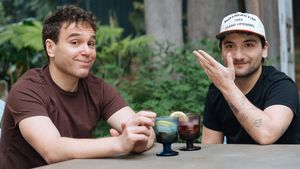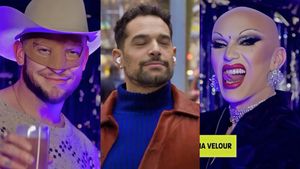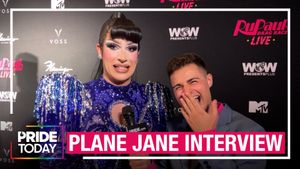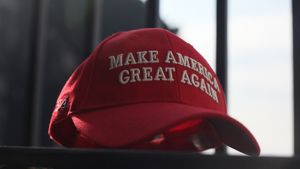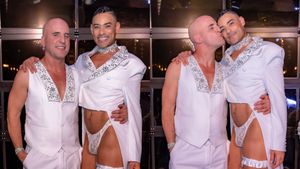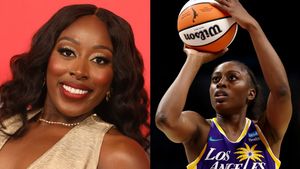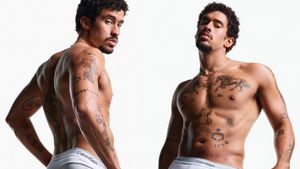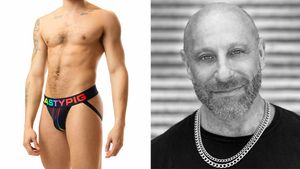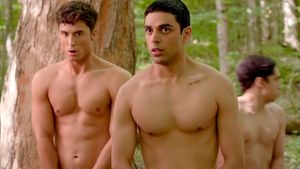Over the past four years, John Paul Brammer's had an unrivaled look into the inner minds of queer people. Through his popular advice column, !Hola Papi!, he's received letters about our innermost worries, our most queer and private humiliations. "The theme of 'What's wrong with me?' is very recurring," he says. "Sort of like, 'Why am I not making friends? Why am I not finding a significant other? Why do I feel so uncomfortable navigating my identity?'
A lot of reassurance is needed. "You just want someone to hear you out and affirm, 'No, you belong here,' or 'There's nothing wrong with you,' or 'This is all part of the process of figuring yourself out.'"
Now Brammer's bringing his trademark wit and heart to his new essay collection, Hola Papi: How to Come Out in a Walmart Parking Lot and Other Life Lessons. Like those who read and write into his column, Brammer is still figuring his life out. It makes for an approachable narrator, one you want to follow through his upbringing as a mixed-race Mexican-American in rural Oklahoma to New York City where Brammer has, to his own surprise, become the queer community's favorite advice columnist.
To celebrate the release of Hola Papi (out now), Brammer stopped by and spoke with the LGBTQ&A podcast. You can read an excerpt below and listen to the full interview on Apple Podcasts or Spotify.
Jeffrey Masters: People often write to you with questions that you can't answer. How do you think about what your role is in answering those?
John Paul Brammer: You're probably not going to hit the nail on the head 100 percent of the time and fix this person's life with your little piece of content on the internet, but that doesn't mean the advice column can't be a worthwhile vehicle for expressing sincere sentiments and helping people tease things out and explore themselves in a deeper way. That's how I've always approached my columns.
I see it as more an avenue for the kind of writing I enjoy, more so than me actually trying to reach in and solve someone's problems.
JM: And then others who read the person's question and can see that other people have the same issues.
JPB: Oh, absolutely. Originally it was being pushed out through Grindr, which had a lot to do with that. I didn't realize at the beginning that there were so many people out there using Grindr who just felt lonely and wanted to be heard. Of course, it makes sense when you think about it, but there were a lot of people who just wanted someone to talk to about some deeper things that were afflicting them.
And people from parts of the world where maybe they don't have a visible LGBTQ community or people they can immediately lean on. They want that friend at the bar that they can just talk to and complain to and it's really cool to fill that niche.
Grindr is such a through-line of my book because I come from rural Oklahoma where I was constantly looking for people to connect with, be it physically or emotionally. And I totally understand how we can end up using technologies like a hookup app to try to find something deeper, to try to find something more meaningful.
JM: What are the recurring themes in the letters that you see?
JPB: A really common letter that I receive is just about loneliness, just the vague feeling of not having someone around and wishing that you did. The theme of "What's wrong with me?" is very recurring. Sort of like, "Why am I not making friends? Why am I not finding a significant other? Why do I feel so uncomfortable navigating my identity?"
And I think that that really speaks to the sense of otherness that is still very prevalent to this day when it comes to LGBTQ people. You're sort of wrestling with something that you don't quite understand. You know there's something different about you and you just want someone to hear you out and affirm, "No, you belong here," or "There's nothing wrong with you," or "This is all part of the process of figuring yourself out."
Lots of reassurance, I found, is needed.
JM: You write about getting a job at a Mexican restaurant in High School because you didn't feel "Mexican enough." Is that something that you still feel?
JPB: Oh yeah. I think that if we really closely observe it, we all, to some extent, feel like we're not quite who we're presenting as or we're not quite who we were told we were. I sort of grew up in the shadow of that American immigrant narrative where yes, my grandparents were really stigmatized, had a hard time assimilating, struggled with English.
So having that direct access to this world that was so different from the one that I was in, and so navigating both of them, sort of enveloped me in a crisis. I thought it was purely a race thing when I was little. Later, I figured out, of course, there's also a class component, there's an immigrant component. There's so many things going on in it and trying to figure that stuff out when you're just a kid can lead you to some really ridiculous decisions, like thinking that if I worked at a tortilla factory, I would figure myself out and I would be more comfortable in myself.
JM: If you didn't learn it there, where did you begin to learn it?
JPB: Well, growing up in rural Oklahoma, I wasn't just one of the only Mexicans around, I was one of the only people around in my immediate area. My neighbors were cows and I didn't have a whole lot of community around me. Just growing up and meeting new people, I started meeting people whose Mexican families looked nothing like mine. I remember the first Mexican I met whose grandparents were rich, and I was like, "That can happen?"
It opened my mind in that way, not only to the unique privileges that other people have, but the ones I have. That goes for any identity, really. Same with gay people. There's so many different kinds of gay people. The more you meet, the more it makes you question yourself and leads you to some fruitful answers, I think.
JM: I'm sure you see in your letters that the majority of us feel like we're not "the right kind of gay person".
JPB: Oh yeah. When I was growing up and coming into my own gayness, the big trend was feeling like you weren't masculine enough and feeling like you needed to pass as straight. And nowadays, because I live in New York and I'm in this other pocket of the world where the opposite comes in, where it's like, "Am I not expressing myself enough? Am I too ashamed to be feminine? Am I too ashamed to put my interests out there and be the swishy person that I want to be because of internalized homophobia or internalized misogyny?"
I grew up with an interest in fashion just because my mom had a lot of fashion magazines around the house. I was smuggling copies of Vogue under my bed and I always thought, "OK, this is nice, but it's not on the table for me." And then I come to New York and I find this place where dressing that way is celebrated and breaking gender boundaries is celebrated and I thought, "Oh God, I could've been doing this all along. I'm so behind."
JM: In the book, you write about pretty severe bullying in middle school. What advice would Hola Papi have for that younger you?
JPB: Oh gosh, I was in such a completely different headspace back then, that any advice would have just bugged me. So many of my problems back then were related to the environment I was in and people not being willing to accept certain kinds of behaviors. I don't think anything I was doing warranted that treatment.
I think my advice would be what I did, just get through it, push on through, and try to think of the people who are there for you in life. Think of the people who make you feel supported and loved. But I always such a weird kid, I don't think any of that would've landed on me.
JM: Weird how?
JPB: I was just out there. I remember very clearly being a kid and just living very much in my own world. The way I see things now is just not the way I saw things back then. I was very much in this haze-type situation, where a lot of things just didn't reach me the way it might reach other people. I had different needs and I had different ways of seeing things.
JM: I appreciate that you included the chapter about your girlfriend growing up. Why was it important to you to include that chapter?
JPB: I just think that that's a subject that we don't talk about enough or that we haven't quite figured out how to approach. I was hearing a lot when I was first coming out about the whole "gold star gay" stuff and I really wanted to dig into my relationship with my girlfriend at the time. There's more richness there than I would've thought. After we broke up and I later came out in life, I sort of dismissed that part as not a real legitimate aspect of my life. But then I look back and I think, "No, I think it was. I think it was an important pivotal part of my life, and I want to explore it as I would any other part of my life."
In any relationship, you have messiness like that, whether or not it's dissonance between attraction or it's dissonance in the emotional sense. The funny thing is, me and her, we got along really great. I looked forward to talking to her all the time. We had a really strong emotional connection and I felt very attached to her in a way that felt very much like love.
It's just at the end of the day, when it comes to physical attraction, I really couldn't get there because I am a homosexual man. But I still found that I learned a lot of things from that relationship and I'm very reluctant to dismiss any relationships I had with women in the past that veered into the romantic context, just because, "Oh, OK. That wasn't really me. I was gay. Didn't know what I was doing. Complete mistake."
No, it was very much an enriching experience in my life.
Hola Papi by John Paul Brammer is out now.
Listen to the full podcast interview on Apple Podcasts or Spotify.
LGBTQ&A is The Advocate's weekly interview podcast hosted by Jeffrey Masters. Past guests include Pete Buttigieg, Laverne Cox, Niecy Nash, Ashley C. Ford, and Roxane Gay. Episodes are released every Tuesday.
